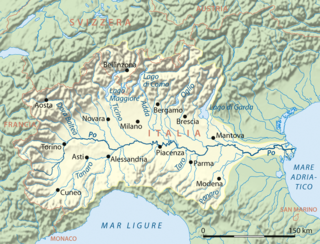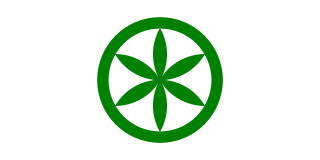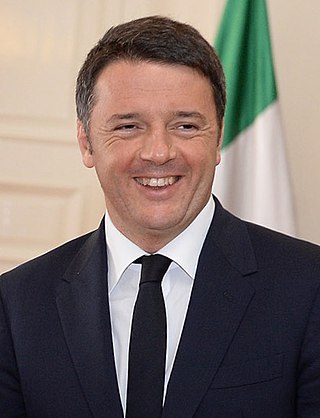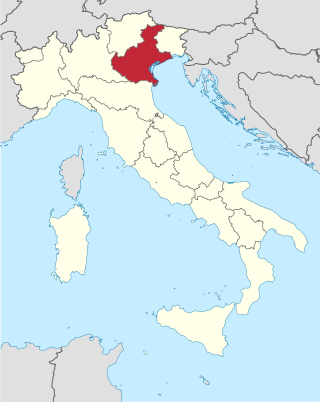Related Research Articles

Padania is an alternative name and proposed independent state encompassing Northern Italy, derived from the name of the Po River, whose basin includes much of the region, centered on the Po Valley, the major plain of Northern Italy.

Venetian nationalism is a nationalist, but primarily regionalist, political movement active mostly in Veneto, Italy, as well as in other parts of the former Republic of Venice.

The Right was a neofascist and national-conservative political party in Italy. Its leader and founder was Francesco Storace.

The 2007 Democratic Party leadership election was held on 14 October 2007 in order to elect the first leader of the Democratic Party, the largest political party in Italy at the time. The election was conducted as an open primary, with all Italian citizens aged at least 16 and non-Italian legal residents being eligible to vote. A minimum fee of one euro was requested to voters in order to take part in the election.

Sergio Mattarella is an Italian politician, jurist, academic and lawyer who has served as the president of Italy since 2015.

Padanian nationalism is an ideology and a regionalist movement demanding more autonomy or even independence from Italy, for Padania, a region encompassing Northern and, to some extent, part of central Italy.

Matteo Renzi is an Italian politician who served as prime minister of Italy from 2014 to 2016. He has been a senator for Florence since 2018. Renzi has served as the leader of Italia Viva (IV) since 2019, having been the secretary of the Democratic Party (PD) from 2013 to 2018, with a brief interruption in 2017.

The Five Star Movement is a political party in Italy. Its leader and president is Giuseppe Conte, Prime Minister of Italy from 2018 until 2021. The M5S was founded on 4 October 2009 by Beppe Grillo, a comedian and blogger, and Gianroberto Casaleggio, a web strategist. From 2014 to 2017, it was a member of the Europe of Freedom and Direct Democracy group in the European Parliament, along with the UK Independence Party and minor Eurosceptic parties. In January 2017, M5S members voted in favour of Grillo's proposal to join the Alliance of Liberals and Democrats for Europe Group but the party was eventually refused, and has since sat as Non-Inscrits in the European Parliament.

A large round of regional elections in Italy took place on 28–29 March in 13 regions out of 20, including nine of the ten largest ones: Lombardy, Campania, Veneto, Lazio, Piedmont, Emilia-Romagna, Apulia, Tuscany and Calabria.

Brothers of Italy is a national-conservative and right-wing populist political party in Italy led by Giorgia Meloni. As FdI was the largest party in the 2022 Italian general election, Meloni became Prime Minister of Italy. According to observers, as the biggest party in the centre-right coalition, FdI marked Italy's first far-right-led government in the republican era and its most right-wing government since World War II.

The 2018 Italian general election was held on 4 March 2018 after the Italian Parliament was dissolved by President Sergio Mattarella on 28 December 2017. Voters were electing the 630 members of the Chamber of Deputies and the 315 elective members of the Senate of the Republic for the 18th legislature of the Italian Republic since 1948. The election took place concurrently with the Lombard and Lazio regional elections. No party or coalition gained an absolute majority in the parliament, even though the centre-right coalition won a plurality of seats as a coalition, and the Five Star Movement (M5S) won a plurality of seats as an individual party.
In the years running up to the 2013 Italian general election, various organisations carried out opinion polls to gauge voting intention in Italy. Results of such polls are given in this article. The date range for these opinion polls is from January 2012. In late 2012, outgoing Prime Minister Mario Monti declared his intention to support a centrist coalition named With Monti for Italy; opinion polls conducted before December 2012 do not consider this. Poll results are reported at the dates when the fieldwork was done, as opposed to the date of publication; if such date is unknown, the date of publication is given instead. Under the Italian par condicio law, publication of opinion polls is forbidden in the last two weeks of an electoral campaign.

The Venetian independence referendum of 2014 was an unofficial, non-binding, online and privately organised poll held among residents of Veneto, one of the 20 regions of Italy, 16–21 March 2014. The vote, known also as the "digital plebiscite" or "Plebiscito.eu", was promoted by Plebiscite 2013, a Venetian nationalist organisation led by Gianluca Busato.
In the years running up to the 2018 Italian general election, held on 4 March, various organisations carried out opinion polls to gauge voting intention in Italy. Results of such polls are given in this article. The date range is from the 2013 Italian general election, held on 24–25 February, to two weeks before the new election, 16 February 2018. Poll results are reported at the dates when the fieldwork was done, as opposed to the date of publication; if such date is unknown, the date of publication is given instead. Under the Italian par condicio law, publication of opinion polls is forbidden in the last two weeks of an electoral campaign.
In the years running up to the 2008 Italian general election, various organisations carried out opinion polls to gauge voting intention in Italy. Results of such polls are given in this article. Poll results are reported at the dates when the fieldwork was done, as opposed to the date of publication; if such date is unknown, the date of publication is given instead. Under the Italian par condicio law, publication of opinion polls is forbidden in the last two weeks of an electoral campaign.

The 2022 Italian general election was a snap election held in Italy on 25 September 2022. After the fall of the Draghi government, which led to a parliamentary impasse, President Sergio Mattarella dissolved the parliament on 21 July, and called for new elections. Regional elections in Sicily were held on the same day. The results of the general election showed the centre-right coalition led by Giorgia Meloni's Brothers of Italy, a radical-right political party with neo-fascist roots, winning an absolute majority of seats in the Italian Parliament. Meloni was appointed Prime Minister of Italy on 22 October, becoming the first woman to hold that position.
In the years running up to the 2022 Italian general election, held on 25 September, various organisations carried out opinion polls to gauge voting intention in Italy. Results of such polls are given in this article. The date range is from after the 2018 Italian general election, held on 4 March, to 9 September 2022. Poll results are reported at the dates when the fieldwork was done, as opposed to the date of publication; if such date is unknown, the date of publication is given instead. Under the Italian par condicio law, publication of opinion polls is forbidden in the last two weeks of an electoral campaign.

The 2019 European Parliament election in Italy were held on 26 May 2019, electing members of the 9th Italian delegation to the European Parliament as part of the European elections held across the European Union.

The 2020 Campanian regional election took place in Campania, Italy, on 20 and 21 September 2020. It was originally scheduled to take place on 31 May 2020, but it was delayed due to the coronavirus pandemic in Italy.
In the years running up to the next Italian general election, which will occur no later than 22 December 2027, various organisations are carrying out opinion polls to gauge voting intention in Italy. The date range is from after the 2022 Italian general election, held on 25 September, to the present day. Poll results are reported at the dates when the fieldwork was done, as opposed to the date of publication; if such date is unknown, the date of publication is given instead. Under the Italian par condicio law, publication of opinion polls is forbidden in the last two weeks of an electoral campaign.
References
- ↑ "Diffusione dei sondaggi" (in Italian). AGCOM. Archived from the original on 20 February 2018. Retrieved 3 November 2022.
- ↑ Crespi, Luigi (20 February 2018). "Il blocco dei sondaggi è il trionfo dell'ipocrisia". HuffPost (in Italian). Archived from the original on 20 February 2018. Retrieved 3 November 2022.